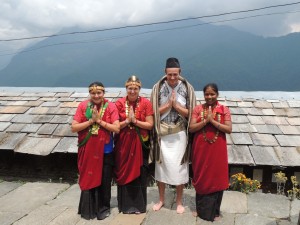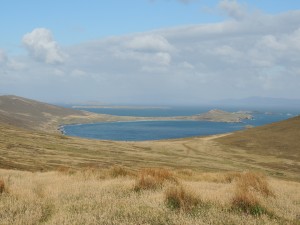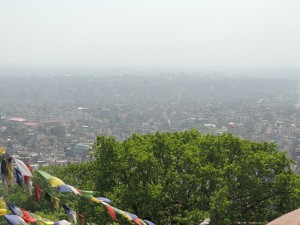The last three months of my life have been an absolute whirlwind of adventure. When organizing my elective I wanted to choose placements that would expand my medical knowledge and improve my clinical skills, but most of all challenge me. The Falkland Islands and Nepal fulfilled those requirements perfectly.
Since I have been back in New Zealand, I’ve actually been really surprised at just how easy it was to fall back into the same old routine. Within a few days of being back the novelty of non-stop electricity and never-ending hot water had worn off. Although I do now and again hesitate when brushing my teeth using tap water instead of bottled water!
I have also slotted straight back into the New Zealand healthcare system. I already find myself frustrated that patients we refer won’t get seen for a couple of weeks or only so many physiotherapy sessions will be funded. Simple things, that when looking back on my experiences overseas seem utterly trivial.
Falkland Islanders wait months before being seen by a specialist and even then have to travel half way around the world for one appointment. Most Nepali will be lucky to see a doctor when they need to let alone get referred on to a physio. It is amazing how humans adapt to their surroundings. Despite the life-changing journey I’ve been on I still fit right back into New Zealand life like I never left.I have been asked by nearly everyone I know what “the highlight” of my trip was. I have thought and thought on this and still cannot narrow it down to even half a dozen occasions. The Falklands and Nepal were in such stark contrast to each other it is near impossible to try to equate those experiences.
Six weeks in the Falkland Islands allowed me to improve my medical practice in a way I could never achieve in a New Zealand teaching hospital. I was given the responsibilities expected of a junior doctor in a small rural hospital. I was able to take a history from and examine every patient that walked through the door. I would formulate my own investigation and management plan then present it to one of the doctors who would either approve it or alter it. By the end of the attachment the doctors were happy for me to work up each patient and only call them in when the investigations were back and the medication chart needed signing. I was able to carry out countless clinical skills such as blood taking, cannulating, suturing and intubating.
Back here I would be competing with several other medical students and numerous junior doctors for the opportunities to perform these procedures. Now the practice I’m working at call on me if they have a patient with difficult veins. This highlights the benefits of learning medicine in rural settings. Since being part of the Rural Medical Immersion Program and spending my elective in the Falklands I cannot recommend it enough. Sure you may not be exposed to all the latest and greatest technology the medical world has to offer, but that technology is useless if you don’t have the skills to take a history off a patient, examine them and formulate a list of differential diagnoses.
As a medical student in a rural hospital you will see ten times the number of patients your urban colleagues will. Every one of those patients will teach you something new and improve your skills. During my final exams, I didn’t remember reading about some disease in a textbook, I remembered seeing a patient with that disease and knowing exactly how we investigated them and what we did to treat them.
Now I feel confident I can go into my first year as a house surgeon with the necessary knowledge and practical skills I need. I don’t think I would be nearly so confident if I had spent all my medical school years standing behind doctors’ shoulders in a big hospital observing them do something rather than doing it myself.
I have always had a love for Rural Medicine. Working in the Falkland Islands has definitely turned that love into a passion. The anticipation of never knowing what will walk through your door next. The challenge of being able to diagnose conditions without relying on advanced technology. The adrenaline rushes of emergency medicine. The satisfaction of building rapport with your primary care patients. Not to mention the stunning countryside and remote landscapes you can find yourself working in. Every aspect appeals to me.Any path you choose to take in medicine takes many years to complete. I view my path into rural medicine not as a long laborious process of training and exams but as a continual adventure. It has already led me to visit and live in places I never thought I would, meet people from all walks of life and participate in all sorts of activities like wilderness and polar medicine courses. I can’t wait to see where it takes me next.
Working in a children’s hospital in Nepal really was an experience like no other for me. I had a much more observational role during my placement with much less hands-on time. However I have no doubt the lessons I learnt will stay with me throughout my medical career.
Working in an under-privileged country exposed me to conditions I would likely never get the chance to see here in New Zealand. Tuberculosis, organophosphate poisoning, flame burns and all sorts of cancers were all presentations I have never seen before and may never come across here. Along with the weird and wonderful diseases though there were the conditions that cause significant morbidity despite being so easy to prevent.
I was certainly brought back down to earth by the children who came to us on death’s door as a result of these simple infections. It was so hard to comprehend how something so easy to prevent and treat such as gastroenteritis could be causing so many deaths. That was what really brought home to me how poor the country as a whole is.
It was frustrating to see families turning down treatment because they could not afford it. I felt totally helpless. What was worse, was knowing that even if we successfully treat every patient we see, there are hundreds who die before they get the chance to get to us. The only way of stopping this occurring is prevention. Every time I popped a chlorine tablet into my bottle of water I felt a pang of guilt for the millions of Nepali who don’t have access to clean water. Sure, various volunteer groups are doing their best to improve conditions in many villages in Nepal but there is still a long, long way to go. It still seems so unfair that in this day and age people must live in such third world conditions.
I have certainly learnt to appreciate how lucky I am. I live in a safe country away from the wars of the world. I have a house to go home to every night. I can afford healthy food and clean drinking water. I have access to free healthcare. On top of that, I am surrounded by luxuries millions of people couldn’t even dream of. Travelling really has given me some perspective. I admit I have returned and just got on with my first world life like I used to, but every night when I climb into my warm bed my thoughts always return to those I met in much less fortunate situations than my own.My future definitely lies here in New Zealand but I hope to return for short periods to both the Falklands and Nepal when I am qualified and give back some time to those people who helped me grow as a doctor and a person. I would like to thank the Pat Farry Rural Health Education Trust for awarding me the Travelling Scholarship, giving me the opportunity to travel to these countries and explore the world through medicine. I learnt so much along the way and only hope I can use those lessons to enhance my practice as a future Rural General Practitioner here in New Zealand.



